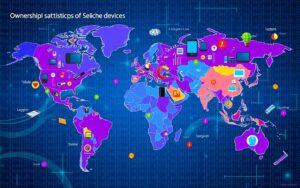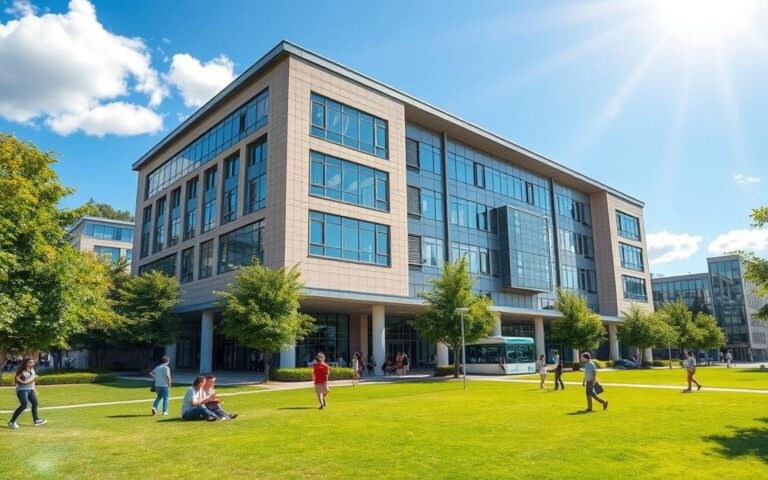What Does the Bible Say About Technology?
Technology is now a big part of our lives, making us wonder what the Bible says about it. The Bible doesn’t give us rules for modern tech, but it offers deep insights. It shows us how human creativity and innovation come from God.
Christianity sees technology as a way to share the gospel. This makes it important to understand its role in history and today. For more on this, check out this article.
The Bible teaches us to use technology wisely and with care. It reminds us to use our innovations in ways that please God. This way, we can enjoy the benefits of technology while staying connected to our faith and community.
The Nature of Technology in Everyday Life
Technology is a big part of our daily lives. It’s woven into how we talk, work, and even pray. Over the last few decades, tech has grown a lot. It has changed how we live and what we expect.
Understanding Technology’s Ubiquity
Technology shows up in many ways, like smartphones and smart home devices. About 2.7 billion people have a mobile phone. This lets them access lots of information and stay connected. But, it also raises questions about privacy and how tech is used.
Examples of Technology in Daily Routine
Technology affects our daily routines in many ways. Here are a few examples:
- Smartphones: They change how we talk and connect, making it easy to stay in touch.
- Home Appliances: Smart fridges and vacuum cleaners make life easier, saving time and effort.
- Church Management Software: It helps churches stay organised, making it easier to plan and communicate.
These examples show how tech fits into our lives. It changes how we interact and work together. It’s good, but we need to be careful about how it affects us.
| Technology | Impact on Daily Life | Potential Issues |
|---|---|---|
| Smartphones | Facilitates instant communication and information access. | Concerns over privacy and excessive screen time. |
| Home Appliances | Increases efficiency and convenience in household management. | Dependency on technology and potential failure of devices. |
| Church Management Software | Enhances organisation and engagement within communities. | Risk of miscommunication and loss of personal touch. |
What is Technology According to the Bible?
The Bible offers a unique view on technology, linking it to human creativity. It shows how technology helps us solve problems and innovate. This perspective sees technology as a way to fulfill God’s plan for us.
Definition of Technology
The Bible defines technology as using knowledge to create and innovate. In Genesis, humans are made in God’s image and given the task to care for the Earth. This shows technology reflects our role in the world, guided by divine wisdom.
The Role of Technology in Human Creativity
Technology is a tool for human creativity, used for good. Bezalel, filled with God’s Spirit, made beautiful designs for the tabernacle. This shows technology as a way to express God’s creativity in us.
As technology advances, it continues to support human creativity. The Bible tells of Noah and King Solomon’s engineering feats. It also warns about the dangers of misusing technology, like the Tower of Babel.
| Biblical Figure | Technological Contribution | Scripture Reference |
|---|---|---|
| Noah | Building the Ark | Genesis 6 |
| Bezalel | Crafting the Tabernacle | Exodus 31:3-5 |
| King Solomon | Constructing the Temple | 1 Kings 6 |
| Abraham & Isaac | Digging Wells | Genesis 21, 26 |
| Jubal | Creating Musical Instruments | Genesis 4:21 |
| Tubal-Cain | Forging Tools | Genesis 4:22 |
The connection between technology, creativity, and the Bible is profound. It encourages us to think about how innovations can serve God’s purposes. This way, we honour our Creator through our creative work.
Does the Bible Say Anything About Technology?
The Bible gives us a deep look at human creativity and God’s view on knowledge. It shows that technology is part of God’s creation and has its own purpose. The stories in the Bible also talk about how human inventions help society grow.
Scriptural References to Human Innovation
Many biblical references show that innovation is key to human life. Genesis 11:6 talks about people working together, saying, “If as one people speaking the same language they have begun to do this, then nothing they plan to do will be impossible for them.” This shows how technology can bring people together and help them achieve great things.
Daniel 12:4 also mentions an increase in knowledge, which is part of God’s plan. While the Bible mainly talks about moral and spiritual knowledge, it also sees the value in everyday advancements. For example, technology was used to build the ark and the temple.
God’s View on Knowledge and Skill
God sees human skills and creativity as gifts to make life better. 2 Chronicles 26:15 shows how God gave builders and craftsmen special talents to improve their communities. These talents show God’s view on using our skills for the good of others.
When we use technology, 1 Corinthians 10:31 reminds us to do it for God’s glory. This means that even big advancements like the printing press or AI should be used wisely. As technology keeps changing, focusing on God’s glory helps us use these changes well. For more on the Bible’s view on technology, check out this resource.
Examples of Technology in Biblical History
The Bible tells us about technology and innovation through history. It shows us how ancient people built grand structures. The Tower of Babel and Solomon’s Temple are examples of their engineering skills.
These stories give us a glimpse into their use of materials and techniques. They show the technological progress of their time.
Building and Construction in the Bible
The Bible is full of examples of ancient construction techniques. The Tower of Babel shows humanity’s drive to reach the heavens. It was a technological wonder and a symbol of unity.
The Temple of Solomon is another example of ancient architecture. It was made with cedar wood and gold. This temple shows the advanced skills of ancient craftsmen.
Technological Innovations: The Case of Bezalel
Bezalel is a key figure in biblical innovation. He was chosen by God to build the Tabernacle. The book of Exodus says he had God’s spirit, giving him amazing skills.
Bezalel’s work on the Tabernacle shows the link between divine inspiration and human talent. His creations were both beautiful and functional. This highlights how innovation was seen as part of a divine plan.
The Church’s Adaptation of Technology
The Church has used technology for centuries. From the start, communities used tools to improve worship and share the gospel. Written scriptures were the first step in spreading Christian teachings widely.
As society changed, so did how the Church reached out. It used new ways to share the message of evangelism with more people.
Historical Use of Technology in Worship
The Church has always welcomed new technology to enhance worship. The printing press made the Bible more accessible. Musical instruments also added depth to church services.
These early uses of technology set the stage for today’s church technology. It helps create a more engaging atmosphere for worship.
The Role of Modern Technology in Evangelism
In today’s digital age, technology has changed how churches connect with people. Social media, live streaming, and apps are key for reaching younger people and those who can’t attend church.
A study found that:
| Statistical Insight | Percentage |
|---|---|
| Churches incorporating technology | 78% |
| Increase in outreach due to technology | 40% |
| Congregation preferring digital access to content | 65% |
| Rise in churches offering online services | 30% |
Churches now spend 15-20% of their budgets on technology. This shows their focus on better communication and engagement. It’s a way to strengthen the faith community through technology.
Ethical Implications of Technology
Technology is advancing fast, bringing up big ethical questions. It’s about how we use tech, which can harm safety and values. For example, tech has led to many deaths in transport accidents each year.
As Jacques Ellul said, tech has good and bad sides. We must think hard about our tech choices.
The Dangers of Misusing Technology
Neil Postman pointed out tech can harm society. Even though Samuel Florman believed we can control tech, worries remain. Gregory Stock thought tech could bring utopia, but others warn of its dangers.
Technology can teach us about God, but it can also lead us astray. We need to be careful with it.
Finding Balance: Technology for Good
Using tech wisely can make it a force for good. The Amish show us how to use tech carefully, keeping community and faith strong. Dr. Brian Brock’s work highlights the need for moral thinking about new tech.
The church can teach us to use tech for the greater good. It shows us how to live with tech in a way that honours Christ.

| Aspect | Negative Implications | Positive Use |
|---|---|---|
| Safety | High rates of transportation accidents due to distractions | Innovations improving vehicle safety technologies |
| Cultural Impact | Displacement of traditional values and practices | Preservation and sharing of cultural heritage through digital platforms |
| Community Engagement | Isolation due to excessive screen time | Facilitation of global connections and virtual communities |
| Misinformation | Spread of false information through social media | Utilisation of technology to promote truth and awareness |
The Limits of Technology
Technology has changed how we connect and see the world. But, it’s key to know its limits. It can’t replace the deep connections we make in person. These real connections are something technology can’t match.
What Technology Cannot Achieve
Technology helps us stay in touch and share info far away. But, it’s not enough for real relationships. Here’s what it can’t do well:
- Authentic emotional connection: Emotions can get lost in digital communication.
- Physical presence: Being there in person is crucial for trust and understanding.
- Deep engagement: Real talks need more than just screens.
Community vs. Digital Connections
Real communities grow from shared experiences and active participation. Our love for digital screens is making this harder. Church gatherings show us that belonging comes from being together, not from screens.
Matthew 18:20 tells us that true community comes from faith and being there in person. Let’s look at how digital and real-life interactions compare:
| Aspect | Digital Connections | Face-to-Face Interactions |
|---|---|---|
| Engagement Quality | Superficial; limited emotional depth | Rich; fosters trust and intimacy |
| Community Building | Fragmented; lacks genuine involvement | Unified; creates lasting bonds |
| Conflict Resolution | Often escalates misunderstandings | Encourages direct and constructive dialogue |
| Support Systems | Virtual; less impactful | Immediate; readily available |
Knowing technology’s limits helps us value real connections. In a world full of digital interactions, finding a balance is key. It helps us keep the human connections that make life worth living.
The Source of Technology in Creation
The origins of technology come from God’s creativity in creating the world. God showed endless creativity when He made the world. He gave humans the gift to innovate and create, as Genesis 1:26-28 says.
This divine command helps us see how technology reflects God’s purpose. It shows how technology is a part of our creative abilities. It helps us grow and develop.
Reflecting God’s Creativity
In the Bible, human creativity is key. It shows how technology lets us express our creativity. For example, Cain built cities and Noah made the Ark.
Even Jesus’ crucifixion shows the link between technology and human actions. The use of wood and nails in His crucifixion is significant. It shows how tools can tell stories of sacrifice and redemption.
Theological Perspective on Human Endeavour
Human efforts in technology mean more than just making things work. These creations have a deeper meaning tied to the divine. Just like how tools in a gym change our bodies, technology changes our actions and attitudes.
Technology helps us communicate better. It shapes the messages we send. This reminds us that how we use technology matters a lot.
Stories of redemption show how human creativity can lead to good. Even when things seem wrong at first, like the Tower of Babel, they can turn out well. This view makes us see technology as a gift from God, meant to improve humanity.
Thinking deeply about technology and faith helps us understand its role in our lives. It shapes our communities. For more on technology and human progress, check out this link.
Conclusion
We’ve looked at how biblical teachings and technology are connected. The Bible doesn’t talk about technology directly. But, its main ideas help us use these tools wisely for talking, learning, and health care.
Thinking about technology’s future, we must see how it can help our spiritual paths. But, we also need to watch out for any ethical problems it might bring.
Technology has both good and bad sides, as shown in the Bible. It can help us follow God’s will and share His message, like in building the ark and temple. Yet, it can also lead to idolatry and pride, as some stories warn us.
This mix of technology’s power reminds us to use it wisely, with faith’s values in mind. It’s key for us and our communities to use technology well, making sure it helps our spiritual growth.
In our fast-changing digital world, we must follow biblical advice. We need to think about who technology empowers and who it controls. It’s also important to consider what we truly need and how technology shows our dignity.
By following the Bible’s teachings, like doing everything for God’s glory (1 Corinthians 10:31) and living wisely (Colossians 4:5), we can use technology thoughtfully. For more on how technology is changing our world, check out this link: how advanced technology is transforming the.
FAQ
How does the Bible view technology?
The Bible sees technology as a sign of human creativity, coming from our divine image. It shows how innovation solves problems and improves life. This is seen in many parts of the Bible.
What role does technology play in everyday Christian life?
Technology is key in daily Christian life. It changes how we communicate, do church activities, and manage our homes. From phones to worship apps, it makes spiritual practices easier to access.
Can technology be used ethically in the Church?
Yes, technology can be used ethically if it honours God and helps the church’s mission. But, we must watch out for its misuse, like spreading false information or hurting real relationships.
What are some biblical examples of technology?
The Bible talks about the Tower of Babel, Solomon’s Temple, and Bezalel’s art. These stories show how skills and innovations were used for God’s purposes.
How does scripture encourage innovation?
Scripture encourages innovation by saying our skills and creativity come from God. Genesis 1:26-28 tells us we are made in God’s image, tasked with caring for the earth.
What are the limitations of technology in fostering community?
Technology helps us communicate but can’t replace real, face-to-face relationships. Matthew 18:20 reminds us of the value of coming together in Christ’s name for true fellowship.
Why is balance important in technology use?
Balance is key to make sure technology doesn’t harm our spiritual lives. It reminds us to honour God in all we do, as 1 Corinthians 10:31 teaches.
How has the Church historically adapted to new technologies?
The Church has always used new tools, from written scriptures to social media. It has moved from printed materials to live streaming to reach more people and make worship easier.
What should Christians reflect on regarding modern technology?
Christians should think about how technology can be used for good. They should be mindful of ethical issues and the need for real, face-to-face connections in their communities.









